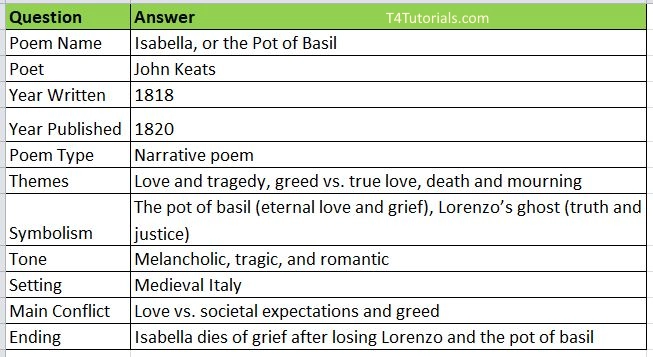Summary:
“Isabella, or the Pot of Basil” is a narrative poem by John Keats, based on a story from Decameron by Giovanni Boccaccio. The poem tells the tragic love story of Isabella, a young woman from a wealthy merchant family, and Lorenzo, a poor worker employed by her brothers. Isabella’s brothers disapprove of their love and murder Lorenzo to protect their family’s wealth. Isabella discovers Lorenzo’s fate through a vision, finds his buried body, and cuts off his head, placing it in a pot of basil, which she waters with her tears. Her grief consumes her, and when her brothers take away the pot, she dies heartbroken
| Question | Answer |
| Poem Name | Isabella, or the Pot of Basil |
| Poet | John Keats |
| Year Written | 1818 |
| Year Published | 1820 |
| Poem Type | Narrative poem |
| Themes | Love and tragedy, greed vs. true love, death and mourning |
| Symbolism | The pot of basil (eternal love and grief), Lorenzo’s ghost (truth and justice) |
| Tone | Melancholic, tragic, and romantic |
| Setting | Medieval Italy |
| Main Conflict | Love vs. societal expectations and greed |
| Ending | Isabella dies of grief after losing Lorenzo and the pot of basil |
10
Score: 0
Attempted: 0/10
Subscribe
Score: 0
Attempted: 0/10
Subscribe

MCQs & Summary of Some Famous Poems of John Keats
- Ode to a Nightingale MCQs & Summary
- Ode on a Grecian Urn MCQs & Summary
- Ode to Autumn MCQs & Summary
- Ode on Melancholy MCQs & Summary
- Ode to Psyche MCQs & Summary
- Ode on Indolence MCQs & Summary
- La Belle Dame sans Merci MCQs & Summary
- Bright Star, would I were steadfast as thou art MCQs & Summary
- When I Have Fears That I May Cease to Be MCQs & Summary
- The Eve of St. Agnes MCQs & Summary
- Lamia by John Keats MCQs & Summary
- Hyperion by John Keats MCQs & Summary
- Isabella, or the Pot of Basil MCQs & Summary
- On First Looking into Chapman’s Homer Summary
- Endymion Summary
Famous English Authors MCQs
- William Wordsworth MCQs
- William Shakespeare MCQs
- Robert Browning MCQs
- W B Yeats MCQs
- Edmund Spenser MCQs
- Chaucer MCQs
- John Milton MCQs
- S T Coleridge MCQs
- Lord Byron MCQs
- PB Shelley MCQs
- John Dryden MCQs
- John Keats MCQs
- Charles Dicken MCQs
- Alfred Lord Tennyson MCQs
- Charles Lamb MCQs
- D.H Lawrence MCQs
- Thomas Hardy MCQs
- Matthew Arnold MCQs
- John Galsworthy MCQs
- George Bernard Shaw MCQs
- T.S Eliot MCQs
- Ben Jonson MCQs
- Francis Bacon MCQs
- Alexander Pope MCQs
- Oliver Goldsmith MCQs
- Joseph Addison MCQs
- Dr Samuel Johnson MCQs
- Henry Fielding MCQs
- Sir Walter Scott MCQs
- Jane Austen MCQs
- Dr. Samuel Johnson MCQs
- English Comedy MCQs (Oliver Goldsmith)
- Alexander Pope MCQs (Neo-Classical Age of English Poetry)
- Daniel Defoe MCQs
- Dr. Jonathan Swift MCQs
- Richard Steele MCQs
- English Drama MCQs
- Elizabethan Drama MCQs [14th to 17th century]
- Elizabethan Prose MCQs
More English Literature MCQs
- English Poetry MCQs
- History of English Literature MCQs
- Sentimental Novels MCQs
- Sentimental Poetry MCQs
- Legends Of English Literature MCQs
- English Literature Quiz
- English Literature Important Multiple Choice Questions Answers
- Sons And Lovers by D H Lawrence MCQs
- The Waste Land, A Poem by T. S. Eliot MCQs
- Drama Origin MCQs
- History of the Renaissance Period MCQs
- English Pros MCQs
- Non-Dramtic Poets Of The Elizabethan Age MCQs
- The Cavalier Poets of 17th-century MCQs
- Metaphysical Poets of 17th century MCQs
- Renaissance Period of 14th, 15th, and 16th centuries MCQs
- Puritan Poet MCQs
- Restoration Comedy by William Congreve & Wycherley MCQs
- Satire MCQs – Renaissance Period by John Dryden
- English Essayists MCQs
- Romantic Period of Romantic Poets MCQs
- English language MCQs
- English Humour MCQs [American Literature]
- Early Writers of American Literature MCQs
- History of American Literature MCQs
- American Prose MCQs [English Realism ]
- American English Critics
- New Englanders Authors MCQs
- MCQs on American Literature After Independence
- American Playwrights MCQs
- New American Poetry MCQs
- British English Critics MCQs
- Ancient English literature MCQs
- Important English Literature MCQs for Public Service Commission
- English Literature Repeated Important MCQs
- CSS English Literature MCQs
- History of Early Period MCQs
- The Anglo-Saxon period MCQs
- The Age of Chaucer in the Early Period MCQs
- The Anglo-Norman Period of French Writers MCQs
- Metrical Romances MCQ (Anglo-Saxon Period)
- Revival of Learning MCQs (1400-1550)
- Applied Linguistics MCQs
- Language Change MCQs